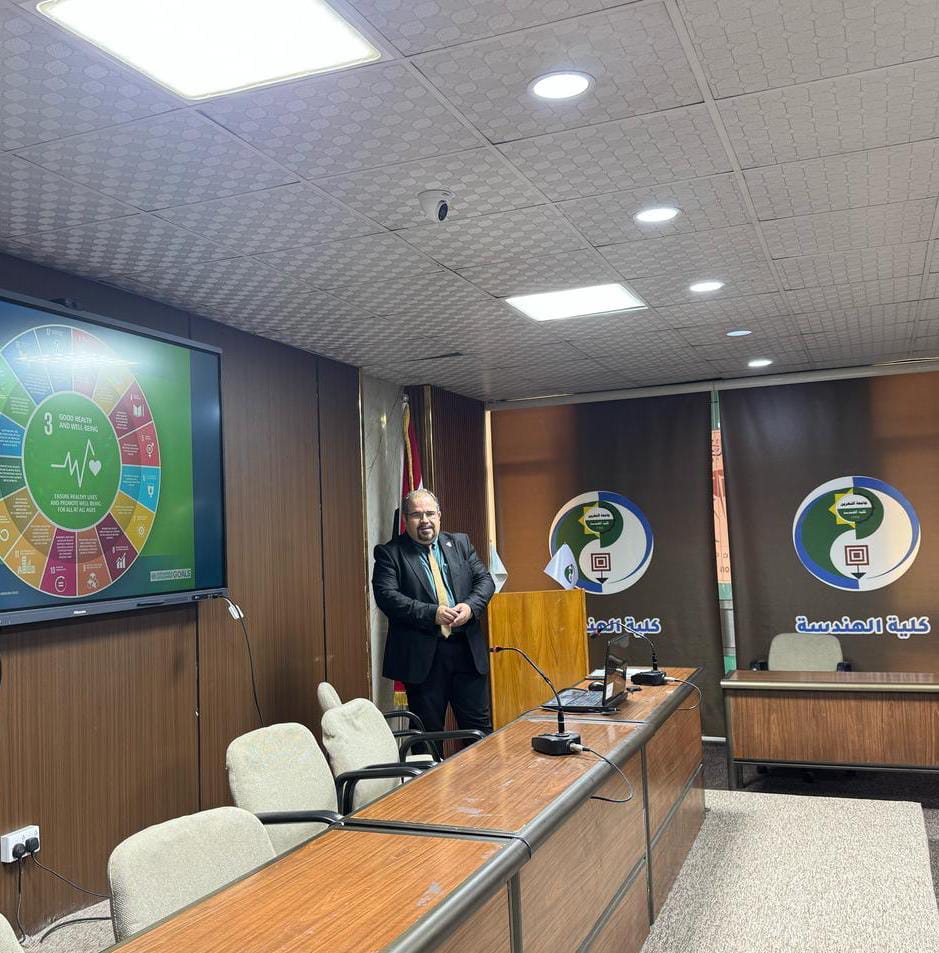ندوة علمية
عدد الزيارات: 20474416 مشاهدة
بواسطة: قسم هندسة الطب الحياتي
تاريخ النشر: 2025-03-10
اخر تصفح: 2025-04-04

قام قسم هندسة الطب الحياتي وبرعاية السيد رئيس جامعة النهرين الأستاذ الدكتور علي عبد العزيز الشاوي واشراف عمادة كلية الهندسة ممثلة بالسيد معاون العميد للشؤون العلمية الأستاذ الدكتور نصير عبد الحبوبي والسيد معاون العميد للشؤون الإدارية الأستاذ الدكتور هيثم علاء حسين في الساعة العاشرة صباح يوم الاثنين الموافق 10 أذار 2025 وعلى قاعة دجلة في رحاب كلية الهندسة ، الندوة العلمية الموسومة "الذكاء الاصطناعي في الرعاية الصحية: تحديات الحاضر وآفاق المستقبل". هدفت الندوة ، التي تندرج ضمن خطة النشاطات العلمية المقررة في القسم للعام الدراسي الحالي، وتحقيقاً للهدف الثالث من أهداف التنمية المستدامة التي أقرتها منظمة الأمم المتحدة (الصحة الجيدة والرفاه)، إلى تسليط الضوء على الدور المهم لتطبيقات الذكاء الاصطناعي في مجالات الرعاية الصحية وكيفية تحديد الجاهزية لذلك. ابتدأت الندوة أعمالها بتقديم محاضرة للتدريسي في قسم هندسة الطب الحياتي الأستاذ المساعد الدكتور حسنين علي لفتة أكد فيها أن استخدام الذكاء الاصطناعي في الرعاية الصحية يحمل إمكانيات كبيرة لتحسين جودة الخدمات وكفاءتها ولكنه يتطلب التعامل بحذر مع التحديات التقنية والأخلاقية مثل حماية الخصوصية والتحيّز والاعتماد المفرط لضمان تحقيق الفوائد المرجوة مع أهمية أن يكون ذلك الاستخدام تحت الإشراف البشري، كما تطرقت المحاضرة إلى المبادئ العامة التي أقرتها منظمة الصحة العالمية لحوكمة وتنظيم ذلك الاستخدام. بعد ذلك أستعرض الطالبان في المرحلة الخامسة في قسم هندسة الطب الحياتي ريا علي محمود و أنس عبد الجليل عبد الكريم بعض المشاريع البحثية التي قاموا بتنفيذها عن تطبيقات الذكاء الاصطناعي واستخدامه في تشخيص بعض الحالات المرضية الخاصة بالجهاز التنفسي وأمراض الدم. تخللت الندوة مناقشات قيّمة مع الحضور الكريم المتمثل بعدد من تدريسيي الأقسام العلمية في كلية الهندسة والمجلس العربي للإختصاصات الصحية في وزارة الصحة وكلية الطب في جامعة ابن سينا للعلوم الطبية والصيدلانية ومعهد الهندسة الوراثية في جامعة بغداد مع عدد من منتسبي كلية الهندسة وطلبة الدراسات العليا والأولية لتختتم الندوة أعمالها بالتوصيات التالية: (١) التأكيد على ضرورة الإهتمام بالتوعية بهذا الموضوع الحيوي بإعتباره أحد التقنيات المهمة التي يتوقع إزدهارها عالمياً خلال المستقبل القريب. (٢) السعي لتطوير المناهج العلمية وتعزيز مصادر التدريب بخصوص استخدام الذكاء الاصطناعي. (٣) زيادة أطر التعاون في مجال البحث العلمي بين الباحثين في هندسة الطب الحياتي و مؤسسات الرعاية الصحية من خلال تبادل الأفكار وتطويرها ضمن مجال تطبيقات الذكاء الاصطناعي. (٤) الإستمرار بتنظيم إقامة فعاليات علمية مشابهة وبالتنسيق مع الكوادر العاملة في المستشفيات والمراكز الطبية التخصصية والمهتمين بهذا الموضوع الحيوي المهم.
The Biomedical Engineering Department, under the patronage of Prof. Dr. Ali Abdulaziz Al-Shawi, President of Al-Nahrain University, and the supervision of the Deanery of the College of Engineering, represented by Prof. Dr. Nasir Abdul-Haboubi, Associate Dean for Scientific Affairs, and Prof. Dr. Haitham Alaa Hussein, Associate Dean for Administrative Affairs, organized a scientific symposium titled:
"Artificial Intelligence in Healthcare: Present Challenges and Future Prospects"
The symposium was held at 10:00 AM on Monday, March 10, 2025, in Dijla Hall at the College of Engineering. It was part of the department’s scientific activities plan for the current academic year and aligned with the third goal of the United Nations Sustainable Development Goals (Good Health and Well-being). The symposium aimed to highlight the crucial role of AI applications in healthcare and assess readiness for its implementation.
The event began with a lecture delivered by Asst. Prof. Dr. Hassanain Ali Lafta, a faculty member in the Biomedical Engineering Department, who emphasized that AI in healthcare holds great potential for improving service quality and efficiency. However, he also cautioned about technical and ethical challenges, such as privacy protection, bias, and over-reliance on AI, stressing the need for human supervision. The lecture also covered the governance principles established by the World Health Organization (WHO) for regulating AI applications in healthcare.
Following the lecture, fifth-year students Ria Ali Mahmoud and Anas Abdul-Jalil Abdul-Karim presented research projects showcasing AI applications in diagnosing respiratory diseases and blood disorders.
The symposium featured valuable discussions with attendees, including faculty members from scientific departments at the College of Engineering, the Arab Board of Medical Specializations at the Ministry of Health, the College of Medicine at Ibn Sina University for Medical and Pharmaceutical Sciences, the Institute of Genetic Engineering at the University of Baghdad, as well as faculty members, graduate students, and undergraduates from the College of Engineering.
Symposium Recommendations:
1️⃣ Emphasizing the importance of raising awareness about AI in healthcare, considering its expected global expansion in the near future.
2️⃣ Enhancing scientific curricula and training resources related to AI applications.
3️⃣ Strengthening research collaboration between biomedical engineering researchers and healthcare institutions by exchanging ideas and developing AI applications.
4️⃣ Continuing to organize similar scientific events in coordination with medical professionals and specialists in hospitals and medical centers.
